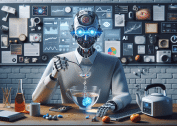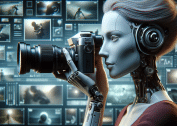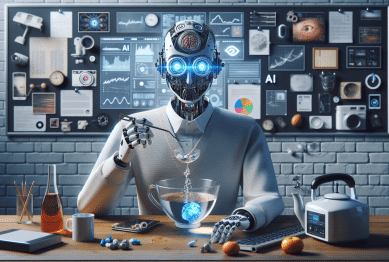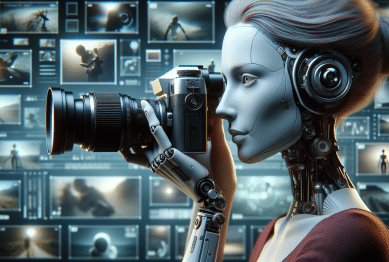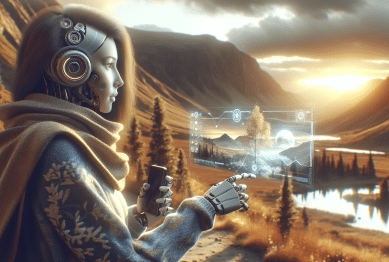Artificial intelligence is transforming workplaces and sparking vital questions about the future of jobs. This guide explores how automation, machine learning, and robotics are reshaping employment prospects, what roles are most affected, and how you can prepare for shifts in the job market.
AI and Automation: Changing the Nature of Work
Artificial intelligence is progressing at a rapid pace, influencing nearly every industry. As advanced AI systems become more capable, companies are adopting automation solutions to improve productivity and efficiency. While AI offers the promise of enhanced workflows, it also raises concerns about the displacement of certain types of work. Many organizations are now using machine learning algorithms not only to automate repetitive tasks but also to analyze vast data sets and inform strategic decisions. The trend is clear—AI-enabled automation is set to touch a broad range of sectors, including manufacturing, logistics, retail, and even creative professions.
With breakthroughs in computer vision and natural language processing, robots and software can now perform complex functions that once required human oversight. From sorting packages in warehouses to scheduling appointments in healthcare, artificial intelligence is being woven into daily business operations. These changes mean that some traditional jobs may fade while new technology-driven roles emerge. Adaptation is essential as routine work is automated, leading many workers to acquire digital skills and shift their focus to tasks that require empathy, judgment, or creative problem-solving.
The expanding footprint of AI encourages businesses to review their hiring strategies. Human-machine collaboration is quickly becoming the new workplace paradigm. As organizations balance between reducing costs and maximizing innovation, they often seek agile employees prepared for continual reskilling. The ability to adapt—whether by learning to manage AI tools or developing uniquely human abilities—becomes highly valued. This ongoing workplace evolution highlights the importance of understanding how AI and automation impact both businesses and employees across all skill levels.
Jobs Most at Risk and Those Set to Grow
Labor market experts agree that AI is more likely to automate roles that involve repeatable, routine tasks. This includes jobs in manufacturing assembly lines, data entry, and simple accounting. Recent studies suggest that transportation is also vulnerable, with self-driving vehicles potentially transforming trucking and delivery services. The hospitality sector could see changes, too, as automated check-ins and AI-powered customer service tools reduce the need for some front-line staff. Yet, while some occupations are declining, the advancing tech landscape is fueling demand for new roles. Data scientists, machine learning engineers, and cyber risk specialists are among the fastest-growing career paths, reflecting the surging interest in AI development and security.
Healthcare offers an intriguing example of both risk and opportunity. AI is now used to read diagnostic images, optimize hospital resource allocation, and support telemedicine consultations, reshaping positions for medical technicians and administrative staff. However, there’s also growing need for professionals who can manage, interpret, and validate AI outputs—developing protocols to ensure patient safety and ethical care. Other sectors seeing growth include education technology, green energy, and digital marketing, as organizations look to leverage automation while maintaining a human-centered approach in decision-making and creativity.
A widely-discussed study by McKinsey Global Institute estimates that up to 375 million workers may need to switch occupational categories as technology advances. Roles centered around critical thinking, interpersonal relationships, and innovation stand out as more resilient to automation. Educators, mental health professionals, engineers, and AI trainers are examples of professions less likely to be replaced by machines. Thus, understanding the evolving skills landscape will help people approach automation’s impact not as a threat, but as an invitation to shape a more dynamic and adaptive career path.
How Artificial Intelligence Shapes Business Strategy
Companies large and small are rethinking business strategy in light of advanced artificial intelligence. Decision-makers increasingly view AI as a means to gain competitive advantage, whether by designing smarter products or unlocking new markets. For many organizations, investing in AI isn’t simply about cost savings; it’s about positioning for long-term growth and innovation potential. Digital transformation initiatives, powered by predictive analytics and intelligent automation, are helping businesses deliver better customer experiences and operate more efficiently. As AI continues to mature, strategic planning increasingly includes ethical dimension—addressing privacy, fairness, and transparency in algorithmic decisions.
Organizations deploying AI must also consider the human element. Change management is crucial, and successful integration often involves upskilling current employees rather than replacing them. Training programs in digital literacy, data analysis, and collaboration with smart machines are becoming standard. This approach fosters an agile workforce capable of leveraging AI’s strengths without losing sight of organizational culture and interpersonal communication. Forward-thinking companies work to ensure AI complements, rather than competes with, employee talents, resulting in a more resilient operational model.
Another challenge is maintaining trust in AI systems. As more decisions are delegated to algorithms—whether in lending, recruitment, or patient care—the need for transparency and accountability rises. Businesses are beginning to prioritize explainable AI and build cross-disciplinary teams to review outcomes. This ensures AI tools are both effective and aligned with ethical standards. By weaving ethical considerations into the fabric of their operations, organizations can adapt more smoothly to ongoing changes in technology and society, securing their reputation and cultivating long-term loyalties among customers and employees alike.
Building Skills for an AI-Driven Future
One of the most significant effects of artificial intelligence is the accelerating demand for new skills. The rapid evolution of workplace technology means that continuous learning is no longer a bonus—it’s critical. Reskilling initiatives are gaining traction, with universities, tech companies, and nonprofit organizations launching programs to help people transition into high-demand careers. Popular fields include cloud computing, programming, robotics, and data analytics, but there’s also growing recognition of the importance of emotional intelligence, collaboration, and creative thinking. These human skills are less susceptible to automation and complement technical expertise in increasingly digital workplaces.
Many public and private institutions offer structured learning paths in STEM, helping both recent graduates and experienced workers adapt to the requirements of the digital economy. From online certificate programs to bootcamps and employer-sponsored upskilling, opportunities to advance are multiplying. For example, employers may provide access to free data analytics courses or support employees in learning advanced AI principles. This democratization of knowledge means individuals in various industries can stay competitive and help organizations thrive as technology progresses.
Participating in lifelong learning also benefits individuals’ career satisfaction and prospects. As people master new technologies—or even become experts in training or managing AI—they often find increased job stability and personal fulfillment. In some cases, professionals with a hybrid skill set find themselves at the forefront of innovative roles, acting as bridges between technology and society. By embracing learning as a continuous journey rather than a destination, people can discover pathways that align with both market demand and personal interests, ensuring greater resilience in a rapidly shifting landscape.
Ethical Considerations and Social Impact
Widespread adoption of artificial intelligence brings a host of ethical and societal issues to the forefront. Questions about data privacy, algorithmic bias, and the potential to widen economic inequality require careful attention. For organizations, developing responsible AI means prioritizing fairness and transparency at every stage of development and deployment. This often involves conducting impact assessments, seeking diverse perspectives, and implementing frameworks to guide ethical decision-making. Companies that invest in doing so are better positioned to navigate regulatory changes and maintain public trust in their AI-enabled products and services.
Many institutions are calling for a collective approach to managing AI’s impact. Awareness campaigns, public consultations, and international cooperation are emerging as ways to ensure technology is harnessed for societal benefit. While some jobs evolve or disappear, others flourish, leading to dynamic shifts across industries and geographies. Preparing for this transformation means not just focusing on individual upskilling, but considering policy tools like social safety nets, educational reform, and inclusive innovation. Ethical guidelines, when built into the DNA of companies and communities, can create a more just and resilient digital future.
Ultimately, how society chooses to manage AI’s risks and opportunities will affect everyone. Cultivating digital literacy, engaging with technology thoughtfully, and advocating for transparent systems play essential roles in ensuring progress benefits as many people as possible. As artificial intelligence continues to shape everyday life, balanced engagement between industry, policymakers, and the public will determine its ultimate legacy in the workforce and beyond.
What the Path Forward Could Look Like
Looking ahead, artificial intelligence is expected to keep evolving, inspiring both excitement and apprehension. Experts suggest proactive planning is the key to harnessing AI for positive outcomes. This includes encouraging interdisciplinary collaboration, scaling up educational initiatives, and creating robust mechanisms to address workforce transitions. As automation handles more predictable tasks, the value of uniquely human skills—like leadership, empathy, and ethical reasoning—will only grow. Forward-looking organizations that invest in people and technology are likely to drive the most sustainable growth, while also building cultures of adaptability and trust.
There’s no single path for adapting to an AI-driven world, but flexibility and curiosity serve as valuable guides. Whether through enrolling in continuing education, participating in industry working groups, or volunteering for innovation projects, individuals can remain engaged with technological change. Simultaneously, policymakers and businesses must work together to shape a future in which the benefits of automation are broadly shared. By anticipating change and responding thoughtfully, everyone—employers, employees, and communities alike—can influence how artificial intelligence transforms the global landscape of work.
Increasing awareness and preparing for ongoing change can empower people in unpredictable times. While AI may automate some jobs, it also creates avenues for new opportunities and innovations. Engagement, education, and thoughtful planning will help ensure the transition to a tech-augmented future is both rewarding and inclusive. The story of work isn’t ending, but evolving—each advance in artificial intelligence is another chapter in a narrative humanity continues to write together.
References
1. McKinsey Global Institute. (n.d.). Jobs lost, jobs gained: Workforce transitions in a time of automation. Retrieved from https://www.mckinsey.com/featured-insights/future-of-work/jobs-lost-jobs-gained-what-the-future-of-work-will-mean-for-jobs-skills-and-wages
2. World Economic Forum. (n.d.). The Future of Jobs Report. Retrieved from https://www.weforum.org/reports/the-future-of-jobs-report-2023
3. International Labour Organization. (n.d.). Artificial Intelligence and the future of work. Retrieved from https://www.ilo.org/global/topics/future-of-work/WCMS_890937/lang–en/index.htm
4. Brookings Institution. (n.d.). What jobs are affected by AI? Retrieved from https://www.brookings.edu/research/what-jobs-are-affected-by-ai-better-paid-better-educated-workers-face-the-most-exposure/
5. United Nations Educational, Scientific and Cultural Organization. (n.d.). Artificial Intelligence and Education. Retrieved from https://en.unesco.org/themes/ict-education/artificial-intelligence
6. Partnership on AI. (n.d.). About Responsible AI. Retrieved from https://partnershiponai.org/responsible-ai/


